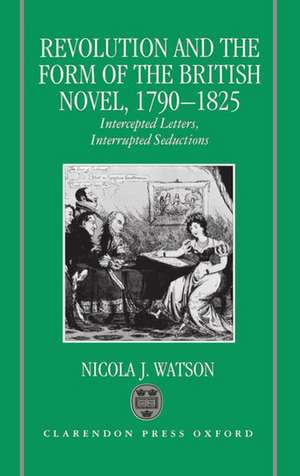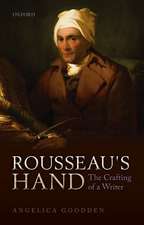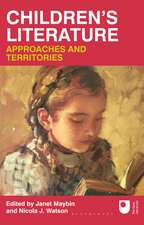Revolution and the Form of the British Novel, 1790-1825: Intercepted Letters, Interrupted Seductions
Autor Nicola J. Watsonen Limba Engleză Hardback – 3 feb 1994
Preț: 684.81 lei
Preț vechi: 1039.16 lei
-34% Nou
Puncte Express: 1027
Preț estimativ în valută:
131.08€ • 142.43$ • 110.18£
131.08€ • 142.43$ • 110.18£
Carte tipărită la comandă
Livrare economică 09-15 aprilie
Preluare comenzi: 021 569.72.76
Specificații
ISBN-13: 9780198112976
ISBN-10: 0198112971
Pagini: 230
Ilustrații: frontispiece
Dimensiuni: 144 x 223 x 20 mm
Greutate: 0.45 kg
Editura: Clarendon Press
Colecția Clarendon Press
Locul publicării:Oxford, United Kingdom
ISBN-10: 0198112971
Pagini: 230
Ilustrații: frontispiece
Dimensiuni: 144 x 223 x 20 mm
Greutate: 0.45 kg
Editura: Clarendon Press
Colecția Clarendon Press
Locul publicării:Oxford, United Kingdom
Recenzii
`the book is well worth persevering with: fascinating, often elegantly written.Literary Review
`fascinating ... elegantly written' Literary Review
'In this wide-ranging study, Watson is more interested - and, certainly, convincing and lucid - in demonstrating the way the errant letter evolves, all the while "retaining something of its scandalously sexualized nature".'Eleanor Ty, Wilfrid Laurier University, Eighteenth-Century Fiction 7:1
Revolution and the Form of the British Novel is faithful to its historical period. In particular, there are helpful thumbnail sketches of the altering political scene as well as useful expansions on networks of literary friendship or influence. Harriette Wilson...serves to remind us how far literary studies are widened by books as elegantly written as Revolution and the Form of the British Novel.
Densely argued, clever in its interpretaton of texts - autobigraphical, biographical as well as novelistic - and displaying considerable sophistication in the deployment of contemporary narrative terminology.
`fascinating ... elegantly written' Literary Review
'In this wide-ranging study, Watson is more interested - and, certainly, convincing and lucid - in demonstrating the way the errant letter evolves, all the while "retaining something of its scandalously sexualized nature".'Eleanor Ty, Wilfrid Laurier University, Eighteenth-Century Fiction 7:1
Revolution and the Form of the British Novel is faithful to its historical period. In particular, there are helpful thumbnail sketches of the altering political scene as well as useful expansions on networks of literary friendship or influence. Harriette Wilson...serves to remind us how far literary studies are widened by books as elegantly written as Revolution and the Form of the British Novel.
Densely argued, clever in its interpretaton of texts - autobigraphical, biographical as well as novelistic - and displaying considerable sophistication in the deployment of contemporary narrative terminology.












